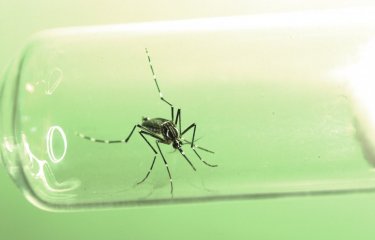Scientists from the Institut Pasteur in Paris and the Institut Pasteur in Cambodia, in collaboration with teams from the CNRS and Inria, have demonstrated that asymptomatic dengue infection in children is associated with activation of the immune system via control mechanisms, resulting in the elimination of viral infection without excessive immune activation. This paper, published in the scientific journal Science Translational Medicine on August 30, 2017, represents an important step in improving understanding of the role played by immunity in dengue viral infection. The findings should pave the way for the development of new vaccine strategies to prevent this disease.
Dengue, also known as “tropical flu”, is continuing to spread rapidly across the world and is now considered as a re-emerging disease. WHO estimates that 50 to 100 million people are infected annually, including 500,000 severe cases requiring hospitalization. The disease is fatal in 2.5% of cases. Around half the global population lives in areas at risk for infection. Although dengue was initially found only in the world’s tropical and subtropical climates, it has now reached Europe. Since 2014, 18 French départements have been affected.
Dengue is a viral disease transmitted to humans by mosquitoes of the Aedes genus. There are four distinct serotypes of the dengue virus: DEN-1, DEN-2, DEN-3 and DEN-4. Individuals infected by one of the serotypes acquire protective immunity against that serotype but not against the others. It is therefore possible to be re-infected by other dengue serotypes. Subsequent infections by other serotypes also increase the risk of developing severe, or hemorrhagic, dengue.
There are currently no specific treatments for infection by the dengue virus. The one commercially available vaccine is only partly effective against infection by the four serotypes of the virus, although it does reduce the risk of developing the severe form of the disease. It cannot be administered to children under the age of 9, and the three-dose vaccination schedule is impractical for travelers.
Despite 50 years of research, the pathophysiological mechanisms that lead some patients to develop a severe clinical form of dengue have not yet been clearly elucidated. These mechanisms are complex and involve several immunological, genetic and viral factors. The increased risk of developing severe symptoms with secondary infection has been associated with the presence of non-neutralizing antibodies, which are thought to exacerbate the infection rather than preventing it.
Some infected individuals are asymptomatic and present with no symptoms. These patients represent a valuable research tool, but it is very hard to identify them so that they can be included in exploratory studies.
To identify the internal mechanisms used to control dengue virus infection in asymptomatic patients, scientists from the Institut Pasteur in Paris, the Institut Pasteur in Cambodia, the CNRS and Inria examined the composition of blood serum, immune cells and the gene expression profile in asymptomatic Cambodian children infected with the dengue virus and compared them to those of patients presenting with clinical signs.
Their research unexpectedly revealed that the patients with no clinical signs had a controlled immune response with increased antigen presentation, and T lymphocyte activation and more limited production of antibodies, compared with the patients presenting with symptoms.
Anavaj Sakuntabhai, Director of the Functional Genetics of Infectious Diseases Unit at the Institut Pasteur in Paris, who co-supervised this research, explained: "Medical research usually focuses on ill patients. By looking at infected but asymptomatic patients, this study can help us understand the mechanisms that prevent the development of symptoms following infection. These findings suggest that vaccine composition should be reviewed to better prevent infection." Tineke Cantaert, from the Institut Pasteur in Cambodia, adds: "These results have been obtained by a large EU-funded collaborative effort and will lead to novel strategies for future vaccine development. We will build further on these results and continue to study immune responses in asymptomatic Cambodian children in detail."
The findings of this original study open up new avenues of research for the development of a vaccine against the dengue virus that will offer more comprehensive protective immunity against the four serotypes of the dengue virus and also prevent the spread of this disease, which represents a considerable global threat.
CAPTATION : Mouse neurons infected with dengue type 1 virus. Colored image. The virion is in green. © Institut Pasteur
Source
Increased adaptative immune responses and proper feedback regulation protect against clinical dengue, Science Translational Medicine, August 30, 2017
Etienne Simon-Lorière (1,2), Veasna Duong (3), Ahmed Tawfik (1,2), Sivlin Ung (4), Sowath Ly (5), Isabelle Casadémont (1,2), Matthieu Prot (1,2), Noémie Courtejoie (1,2), Kevin Bleakley (6,7), Philippe Buchy (3,8), Arnaud Tarantola (5,8), Philippe Dussart (3), Tineke Cantaert (4), Anavaj Sakuntabhai (1,2)
1 Functional Genetics of Infectious Diseases Unit, Department of Genomes and Genetics, Institut Pasteur, 75015 Paris, France.
2 CNRS, Associated Research Unit 3012, 75015 Paris, France.
3 Virology Unit, Institut Pasteur in Cambodia, Institut Pasteur International Network, 12201 Phnom Penh, Cambodia.
4 Immunology Group, Institut Pasteur in Cambodia, Institut Pasteur International Network, 12201 Phnom Penh, Cambodia.
5 Epidemiology and Public Health Unit, Institut Pasteur in Cambodia, Institut Pasteur International Network, 12201 Phnom Penh, Cambodia.
6 INRIA Saclay, 91120 Palaiseau, France.
7 Orsay Mathematics Department, AQ2 91400 Orsay, France.
8 GlaxoSmithKline (GSK) Vaccines, 637421 Singapore, Singapore.
DOI: 10.1126/scitranslmed.aal5088





